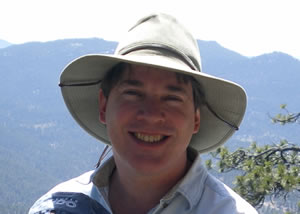David Pollock received his Ph.D. in Biological Sciences from Stanford University in 1995, and then spent 5 years at the National Institute for Medical Research in London, UC Berkeley, and Los Alamos National Laboratories on a Hitchings-Elion Fellowship from the Wellcome Trust, and a Director's Fellowship from LANL. Following this he spent 6 years at Louisiana State University. He's now associate professor of Biochemistry and Molecular Genetics at UC Denver’s School of Medicine. His research program is on the interaction between molecular sequence, structure, and evolution, and on evolutionary genomics. He has been studying evolution since he was an undergraduate in the laboratory of UC Berkeley’s Allan C. Wilson, one of the founding fathers of molecular evolution, and his first job as a professor was in “evolutionary theory”. He recently founded the Consortium for Comparative Genomics to enhance genomic research and the utilization of high-throughput sequencing in Colorado, and co-founded (with James DeGregori and Jeff Kieft) the Colorado Evolutionary Response Team, which is a way for Colorado researchers to keep in touch about threats to evolution, biology, and basic science teaching in Colorado, and to form an organized response. Dr. Pollock also has a nascent project (with Jeff Kieft) called “Wright’s Erasers” to promote accessible writing by basic scientists on the topic of how evolution impacts their research. |
 |
About the subject
Due to the genome project, we’re getting a whole lot more sequence these days than we used to. This sequence is providing fundamental information about how functional molecules (RNA and proteins) evolve. Our view on this evolution has swung from pure adaptation to pure neutrality to a currently more nuanced view, with Darwinian concepts such as adaptation, coevolution, and convergence mixed with “nearly neutral” evolution. At the same time, genomic information has been dramatically disappointing as a means of identifying the root causes of complex human disease. Does evolution provide the means for understanding these elusive “quixotic trait loci” (Weiss 2008)? Are we all just mutants anyway? Is the human species evolving or eroding? |
 |
Readings and web sites
These papers should be available for download from just about anyone's computer. Some are pretty technical, but if you are up for that, they are very cool.
Ken Weiss: Tilting at Quixotic Trait Loci (QTL): An evolutionary perspective on genetic causation. Click here.
Castoe, Jiang, Gu, Wang, and Pollock, Adaptive evolution and functional redesign of core metabolic proteins in snakes. Click here.
Castoe et al: An ancient adaptive episode of convergent molecular evolution confounds phylogenetic inference. Click here.
Hawk, Wang, Cochran, Harpending, and Moyzis: Recent acceleration of human adaptive evolution. Click here.
